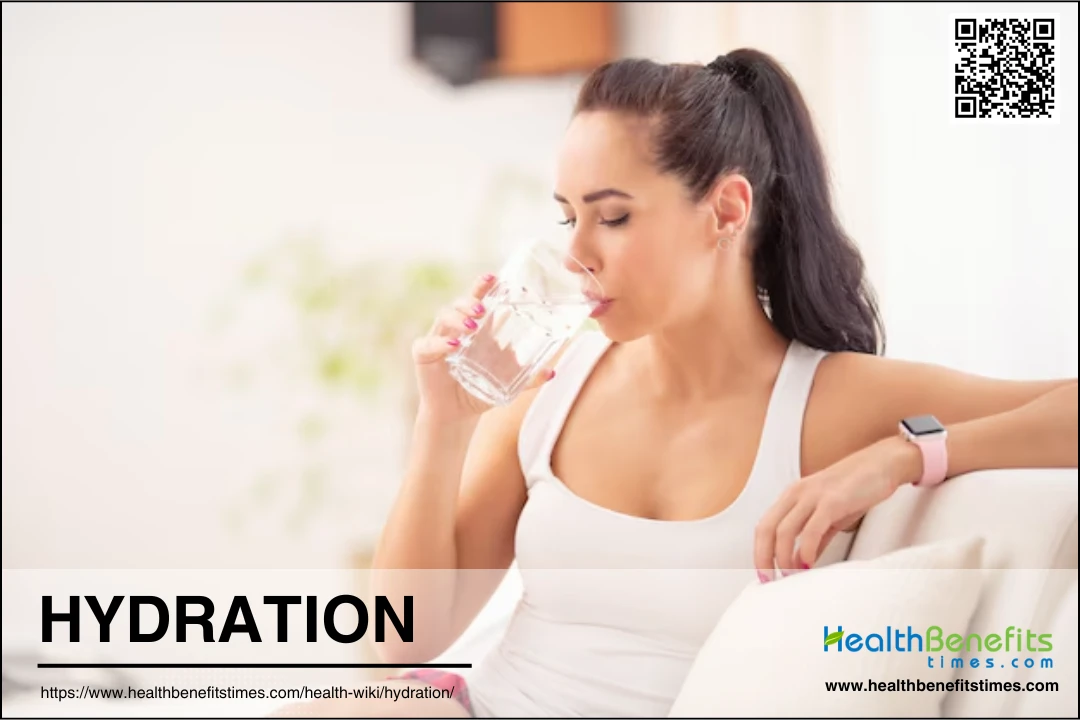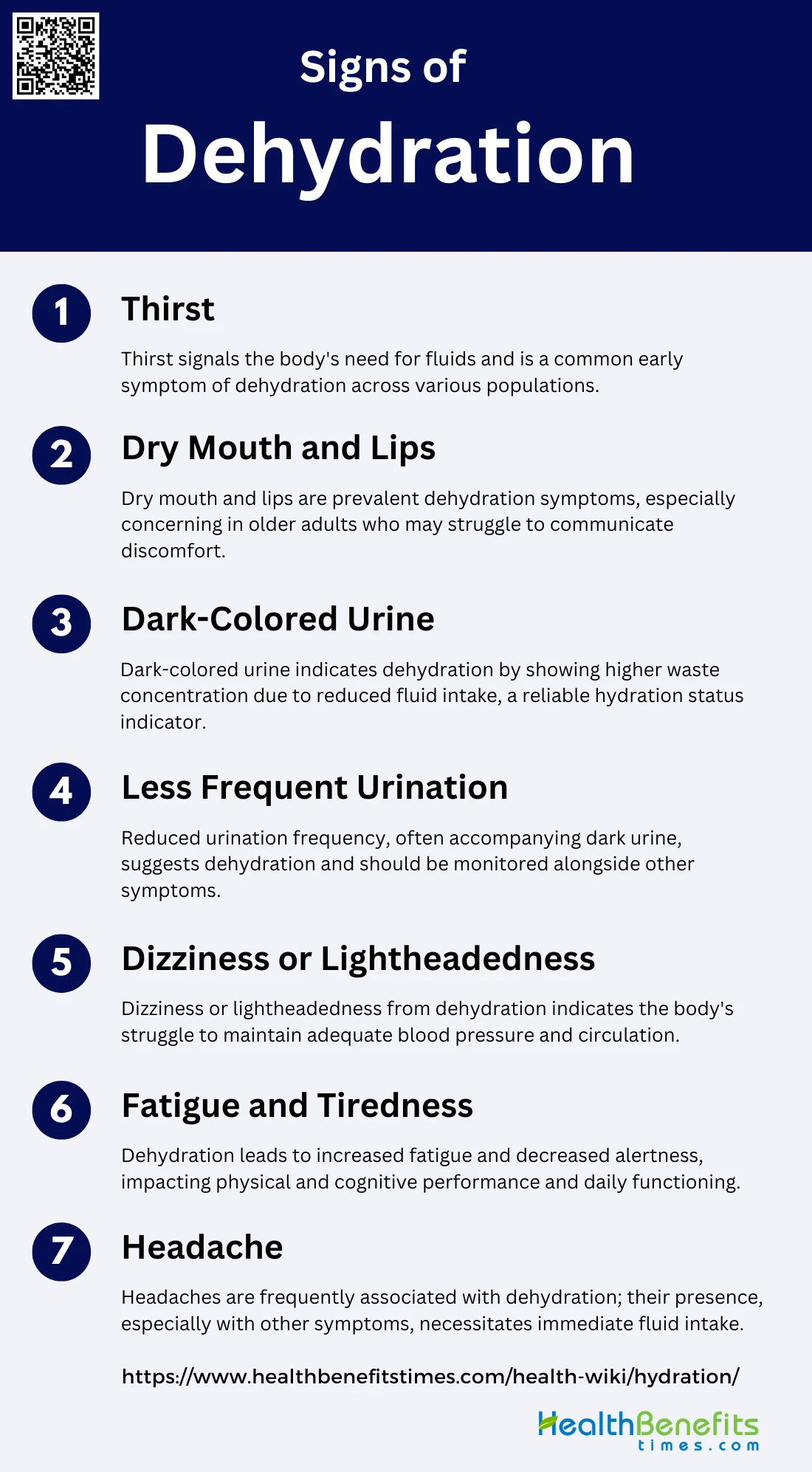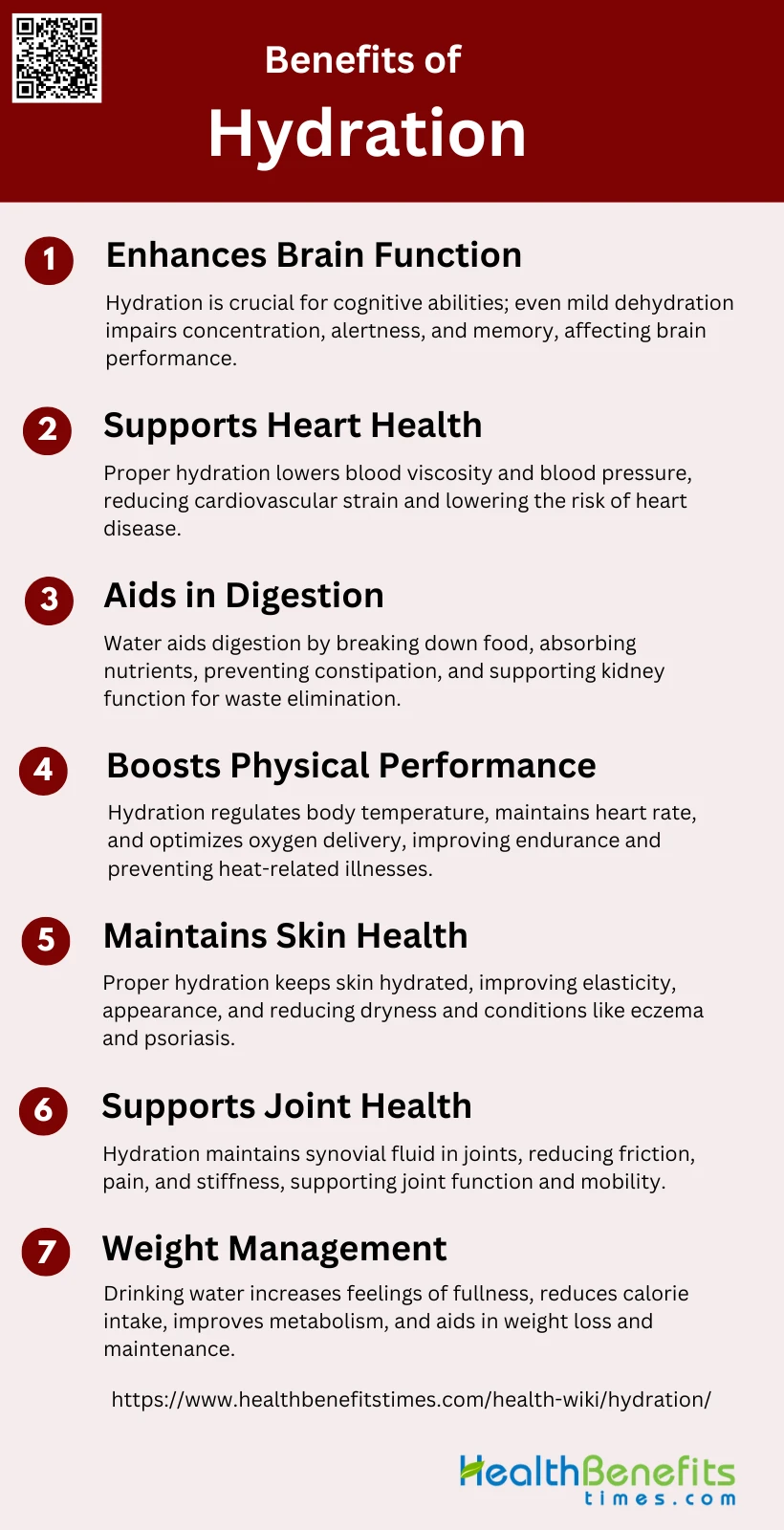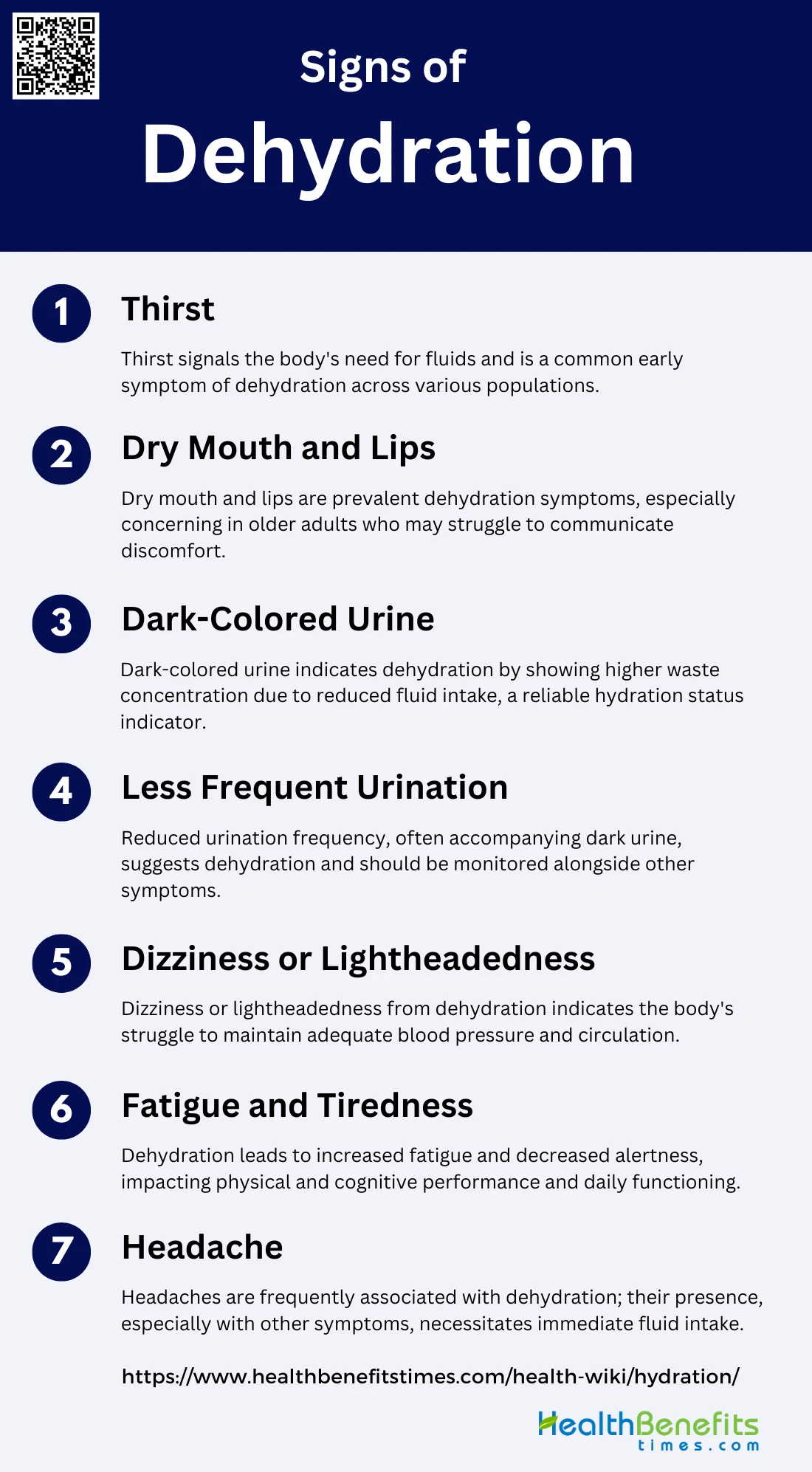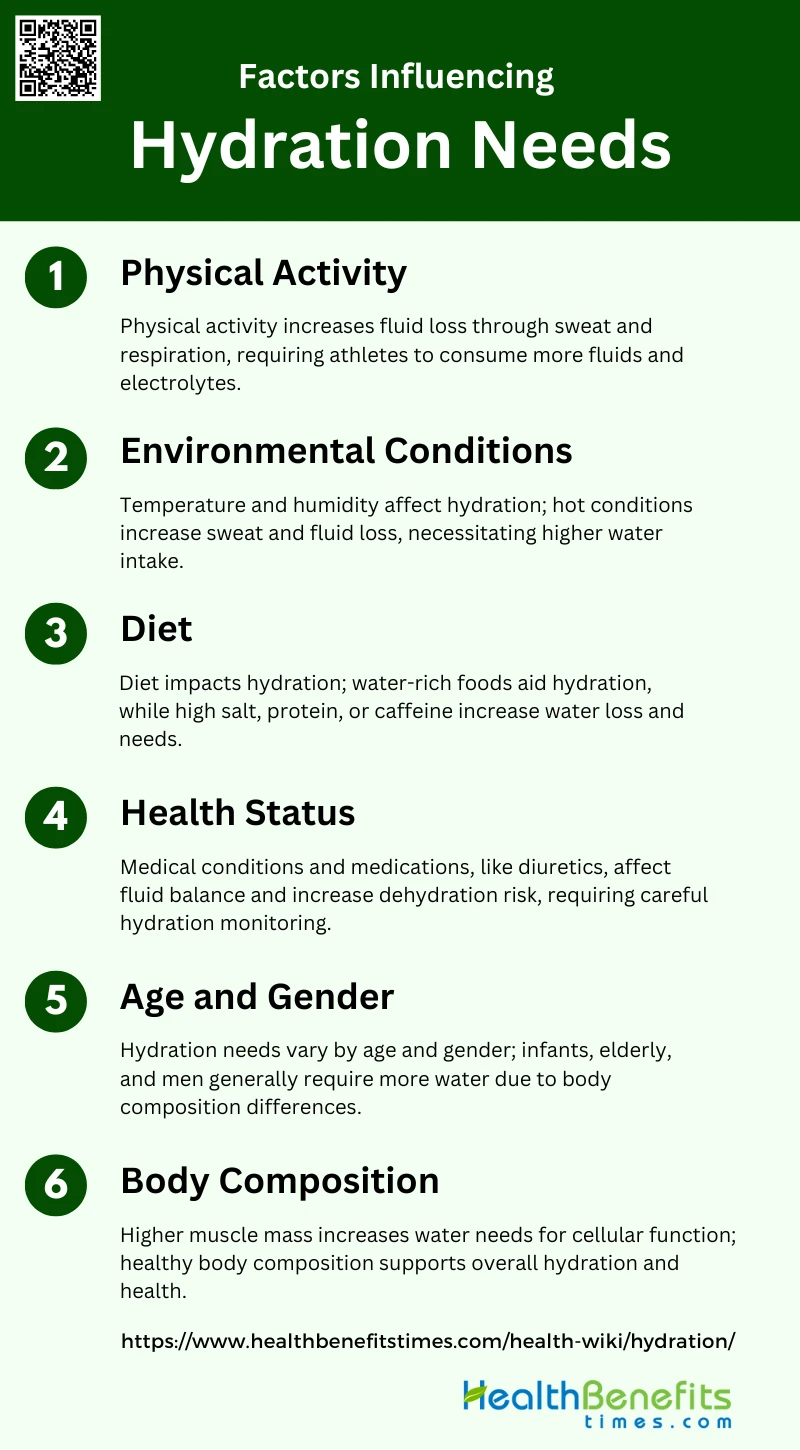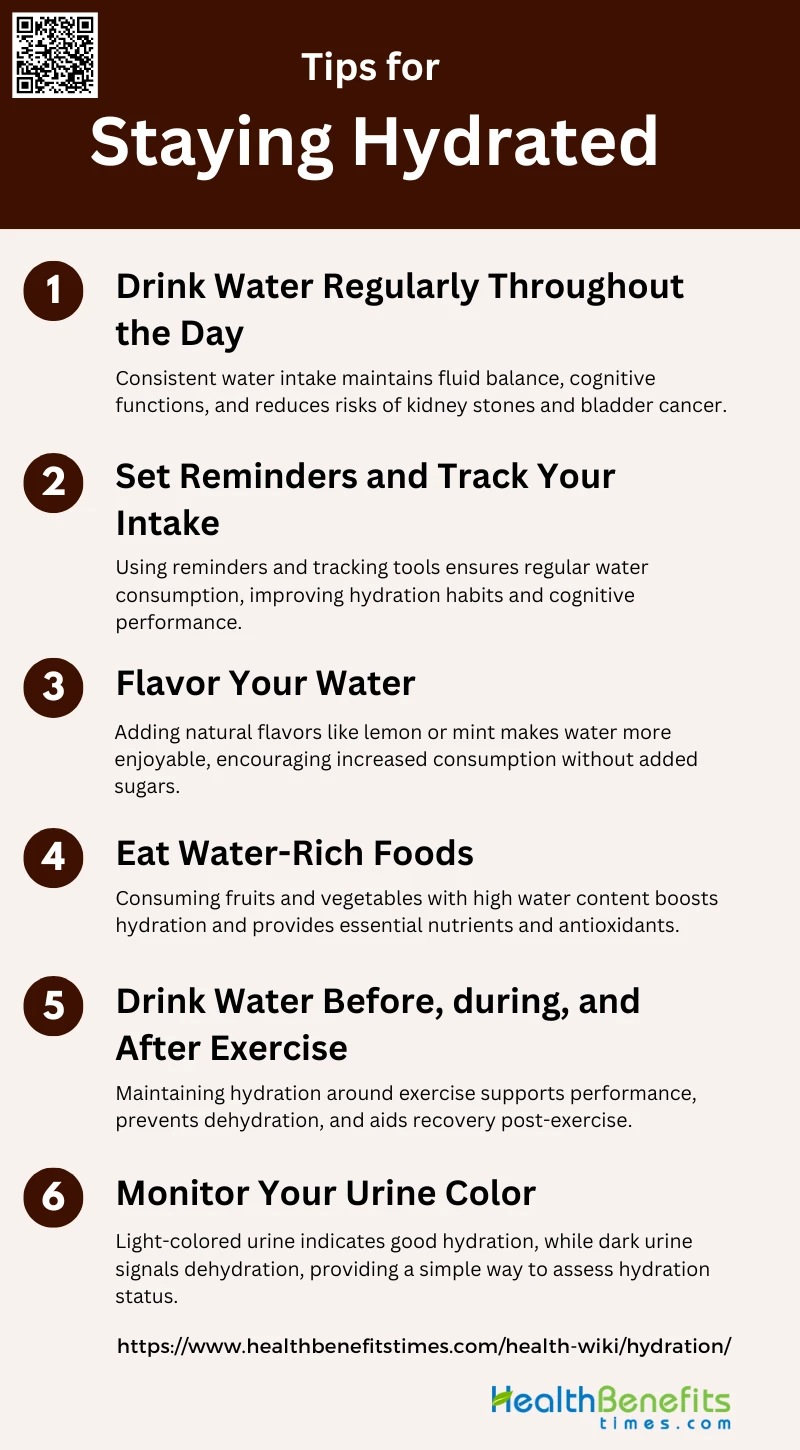Hydration is the process of maintaining an adequate balance of fluids in the body, essential for sustaining life and supporting various physiological functions. Water, the primary component of body fluids, facilitates numerous vital processes such as nutrient transport, temperature regulation, and waste elimination. Proper hydration ensures that cells, tissues, and organs operate efficiently, contributing to overall health and well-being. Dehydration, or the lack of sufficient water, can disrupt these processes, leading to adverse health effects such as impaired cognitive function, kidney stones, and heat-related illnesses. Conversely, over hydration can also pose risks, including electrolyte imbalances. Therefore, maintaining optimal hydration is crucial for physical and mental performance.
Signs of good hydration
Good hydration is essential for maintaining overall health and well-being. Recognizing the signs of proper hydration can help you ensure that your body is functioning optimally. Here are some key indicators that you are well-hydrated:
1. Urine Color
Urine color is often used as an indicator of hydration status, with lighter colors typically suggesting better hydration. However, research indicates that urine color alone may not be a reliable measure. For instance, a study found that neither urine color nor urine specific gravity could effectively discriminate hydration status in older adults. Similarly, another study concluded that urine color, osmolality, and specific electrical conductance are poor indicators of hydration status during post-exercise rehydration. Therefore, while urine color can provide some insight, it should be used in conjunction with other markers for a more accurate assessment.
2. Skin Elasticity
Skin elasticity, or turgor, is another physical sign used to assess hydration. Decreased skin turgor is often associated with dehydration, but its reliability varies. In a study involving nursing home residents, impaired skin turgor was found to correlate more with age than with hydration status. Another study on children with acute gastroenteritis found that decreased skin turgor was a significant indicator of mild to moderate dehydration. Thus, while skin elasticity can be a useful indicator, its accuracy may be influenced by factors such as age and overall health.
3. Frequency of Urination
The frequency of urination is a commonly observed sign of hydration. Frequent urination generally indicates good hydration, while infrequent urination can be a sign of dehydration. However, the relationship between urination frequency and hydration status is complex. For example, a study on young healthy men found that urine output did not correlate well with other urinary variables like color and osmolality during post-exercise rehydration. Therefore, while frequency of urination can provide some clues, it should not be the sole indicator of hydration status.
4. Thirst
Thirst is a natural and immediate indicator of the body’s need for water. It is a subjective measure but can be quite effective. A study on young healthy adults found that a thirst scale (0-9) was a valid and practical tool for identifying mild dehydration, with high diagnostic accuracy for both intracellular and extracellular dehydration. Another study on nursing home residents found that subjects reported less thirst with increasing Fluid Retention Index scores, suggesting a complex relationship between perceived thirst and actual hydration status. Therefore, while thirst is a useful indicator, it should be considered alongside other signs and symptoms.
5. Breath and Mouth
Dry mouth and changes in breath can also indicate hydration status. A study on dying patients found that 87% of those who could respond reported a dry mouth, and 83% felt thirsty, although no significant association was found between these symptoms and their level of hydration. Another study on older adults found that dry mucous membranes were a poor indicator of dehydration. Therefore, while dry mouth and changes in breath can be signs of dehydration, they are not definitive and should be used in conjunction with other indicators.
6. Absence of Dehydration Symptoms
The absence of dehydration symptoms such as dry mouth, sunken eyes, and decreased skin turgor generally suggests good hydration. However, the reliability of these symptoms varies. For example, a study on children found that clinical signs of dehydration became apparent at 3-4% dehydration, but the degree of dehydration was often overestimated, leading to unnecessary treatments. Another study on older adults found that physical signs like sunken eyes and dry mucous membranes showed poor sensitivity for detecting dehydration. Therefore, while the absence of these symptoms can indicate good hydration, it is essential to use a combination of signs and markers for a more accurate assessment.
Benefits of Hydration
Staying well-hydrated is crucial for maintaining optimal health and performance. Proper hydration offers numerous benefits that can enhance both your physical and mental well-being. Here are some key benefits of staying hydrated:
1. Enhances Brain Function
Adequate hydration is crucial for maintaining optimal brain function. Studies have shown that even mild dehydration can impair cognitive abilities such as concentration, alertness, and short-term memory. For instance, a randomized controlled trial demonstrated that water supplementation significantly improved working memory and reduced feelings of anger and fatigue among young adults. Additionally, dehydration has been linked to decreased brain activity in regions associated with cognitive tasks, further emphasizing the importance of staying hydrated for mental performance. Therefore, maintaining proper hydration levels is essential for cognitive health and overall brain function.
2. Supports Heart Health
Hydration plays a vital role in cardiovascular health. Inadequate water intake can lead to dehydration, which increases blood viscosity, haematocrit, and fibrinogen levels, thereby straining the cardiovascular system. A study on Japanese adults found that increased water intake significantly reduced systolic blood pressure, highlighting the cardiovascular benefits of proper hydration. Furthermore, adequate hydration is associated with a lower risk of coronary heart disease and improved endothelial function. Thus, maintaining good hydration is essential for supporting heart health and preventing cardiovascular diseases.
3. Aids in Digestion
Proper hydration is essential for maintaining healthy gastrointestinal function. Water aids in the digestion process by helping to break down food and absorb nutrients more efficiently. Dehydration can lead to gastrointestinal issues such as constipation and impaired kidney function. Increased water intake has been shown to reduce blood urea nitrogen concentration and support kidney function, which is crucial for waste elimination and overall digestive health. Therefore, staying well-hydrated is important for ensuring smooth and efficient digestive processes.
4. Boosts Physical Performance
Hydration is critical for maintaining physical performance, especially during exercise. Proper hydration helps regulate body temperature, maintain heart rate, and optimize oxygen delivery to muscles. Studies have shown that dehydration can lead to increased fatigue, reduced endurance, and a higher risk of heat-related illnesses. For athletes, drinking adequate amounts of water can prevent hyponatremia and improve anaerobic exercise performance by maintaining acid-based balance. Thus, staying hydrated is essential for achieving peak physical performance and preventing exercise-related health issues.
5. Maintains Skin Health
Adequate hydration is important for maintaining healthy skin. Water helps to keep the skin hydrated, which can improve its elasticity and appearance. Dehydration can lead to dry, flaky skin and exacerbate conditions such as eczema and psoriasis. Although the evidence is largely associative, maintaining proper hydration levels is believed to support skin health by promoting better blood flow and nutrient delivery to skin cells. Therefore, drinking enough water is essential for keeping the skin healthy and vibrant.
6. Supports Joint Health
Hydration is crucial for maintaining joint health. Water is a key component of synovial fluid, which lubricates and cushions the joints, reducing friction and wear during movement. Dehydration can lead to reduced synovial fluid production, increasing the risk of joint pain and stiffness. Proper hydration helps to maintain the elasticity and flexibility of cartilage, which is essential for joint function and mobility. Therefore, staying well-hydrated is important for supporting joint health and preventing joint-related issues.
7. Weight Management
Hydration plays a significant role in weight management. Drinking water can help to increase feelings of fullness and reduce overall calorie intake, which is beneficial for weight loss and maintenance. Studies have shown that there is an inverse relationship between water consumption and body weight, body fat, and waist circumference. Additionally, water intake can help to improve metabolism and support the body’s natural detoxification processes. Therefore, maintaining adequate hydration is an effective strategy for managing weight and promoting overall health.
Signs of Dehydration
Dehydration can have serious effects on your health and well-being. It’s important to recognize the signs early to prevent complications. Here are some common signs of dehydration:
1. Thirst
Thirst is one of the most immediate and recognizable signs of dehydration. It serves as the body’s natural mechanism to signal the need for fluid intake. Studies have shown that thirst is a common symptom among various populations, including palliative care cancer patients and athletes. In a study conducted on palliative care cancer patients, thirst was rated as a moderately severe symptom, with a mean rating of 53.8 mm on a 100-mm visual analogue scale. Similarly, in a study on Brazilian jiu-jitsu athletes, 82.4% reported increased thirst as a symptom associated with rapid weight loss and dehydration. These findings underscore the importance of recognizing thirst as an early indicator of dehydration.
2. Dry Mouth and Lips
Dry mouth and lips are also prevalent symptoms of dehydration. In a study assessing public knowledge of dehydration in Riyadh, Saudi Arabia, dry lips were recognized by 87% of participants as a symptom of dehydration. Another study on palliative care cancer patients found that dry mouth was a common symptom, with a mean severity rating of 60.0 mm on a 100-mm visual analogue scale. These symptoms are particularly concerning in older adults, as they may not always be able to communicate their discomfort effectively. Therefore, dry mouth and lips should be closely monitored as indicators of dehydration, especially in vulnerable populations.
3. Dark-Colored Urine
Dark-colored urine is a reliable indicator of dehydration, as it reflects the concentration of waste products in the urine due to reduced fluid intake. A study on university students in the UAE found that 46% of participants were in danger of hypohydration based on urine color. These findings highlight the importance of monitoring urine color as a simple and effective way to assess hydration status.
4. Less Frequent Urination
Less frequent urination is another sign of dehydration, often accompanying dark-colored urine. In a study on older adults, it was found that urine volume and frequency are not always reliable indicators of dehydration, but they can still provide useful information when combined with other symptoms. In the context of athletes, reduced urination frequency was observed alongside other dehydration symptoms, such as increased heart rate and dizziness. Therefore, less frequent urination should be considered a potential sign of dehydration, especially when observed with other symptoms.
5. Dizziness or Lightheadedness
Dizziness or lightheadedness can occur due to dehydration, as the body struggles to maintain adequate blood pressure and circulation. In a study on the clinical signs of dehydration in children, dizziness was not a statistically significant indicator, but it was still reported by some participants. These findings suggest that while dizziness may not be a primary indicator, it should not be overlooked, particularly in physically active individuals and those with underlying health conditions.
6. Fatigue and Tiredness
Fatigue and tiredness are common symptoms of dehydration, affecting both physical and cognitive performance. A study on the effects of fluid deprivation in women found that dehydration led to increased fatigue and decreased alertness. Similarly, in a study on older adults, fatigue was identified as a potential marker of early water-loss dehydration, with a sensitivity of 0.71 and specificity of 0.75. These results indicate that fatigue and tiredness are significant symptoms that can impact daily functioning and should be addressed promptly to prevent further dehydration.
7. Headache
Headache is another symptom frequently associated with dehydration. In a study on public knowledge of dehydration, headache was recognized by 40.71% of participants as a symptom. The presence of a headache, especially when accompanied by other dehydration symptoms, should prompt immediate attention to fluid intake to alleviate discomfort and prevent further complications.
Sources of Hydration
Maintaining proper hydration is essential for overall health, and it can be achieved through various sources. Understanding these sources can help you stay hydrated throughout the day. Here are some common sources of hydration:
1. Water-Rich Fruits
Water-rich fruits are an excellent source of hydration due to their high water content. Fruits such as watermelon, strawberries, and cantaloupe are particularly effective in maintaining hydration levels. These fruits not only provide water but also essential vitamins and minerals that support overall health. The natural sugars in these fruits can also offer a quick energy boost, making them ideal for consumption during physical activities or hot weather. Their high water content helps in maintaining fluid balance and can be a refreshing alternative to plain water, especially for those who find it challenging to drink enough water throughout the day.
2. Water-Rich Vegetables
Vegetables like cucumbers, lettuce, and celery are known for their high water content, making them excellent choices for hydration. These vegetables are not only low in calories but also rich in essential nutrients such as vitamins A and C, potassium, and fiber. Consuming water-rich vegetables can help maintain fluid balance and support digestive health. They can be easily incorporated into salads, smoothies, or eaten as snacks. Their hydrating properties are particularly beneficial in hot climates or during intense physical activities, where maintaining hydration is crucial for optimal performance and health.
3. Dairy and Other Beverages
Dairy products like milk and other beverages such as oral rehydration solutions (ORS) have been shown to be effective in promoting hydration. Studies indicate that full-fat and skimmed milk have a higher Beverage Hydration Index (BHI) compared to water, meaning they are more effective at retaining fluids in the body. The presence of electrolytes, proteins, and carbohydrates in these beverages contributes to their superior hydration properties. ORS, in particular, has been found to significantly reduce urine output, thereby enhancing fluid retention. These beverages are particularly useful in situations where maintaining hydration is critical, such as during prolonged physical activity or in hot environments.
4. Hydrating Foods with Electrolytes
Foods and beverages containing electrolytes play a crucial role in maintaining hydration and fluid balance. Electrolytes such as sodium, potassium, and magnesium help regulate fluid distribution in the body and are essential for muscle function and nerve signaling. Studies have shown that beverages with added electrolytes, carbohydrates, and proteins can significantly improve hydration compared to plain water. For instance, sports drinks and certain dipeptide-electrolyte combinations have been found to enhance fluid retention and reduce urine output, making them effective for rehydration. These hydrating foods and beverages are particularly beneficial for athletes and individuals engaged in strenuous physical activities.
Factors Influencing Hydration Needs
Hydration needs can vary greatly depending on several factors. Understanding these factors can help you maintain optimal hydration levels. Here are some key factors influencing hydration needs:
1. Physical Activity
Physical activity significantly influences hydration needs due to increased fluid loss through sweat and respiration. Athletes, in particular, experience higher rates of dehydration if they do not consume adequate fluids and electrolytes before, during, and after training sessions. Studies have shown that physical activity, especially when performed in hot environments, can lead to substantial fluid losses, necessitating increased water intake to maintain hydration status. Monitoring hydration status through biomarkers such as urine color and body mass is crucial for athletes to ensure optimal performance and prevent dehydration-related health issues.
2. Environmental Conditions
Environmental conditions, particularly temperature and humidity, play a critical role in determining hydration needs. High ambient temperatures increase sweat production, leading to greater fluid loss and a higher risk of dehydration. Research indicates that even with reduced physical activity in hot conditions, non-renal water losses such as sweating remain elevated, necessitating increased water intake to maintain hydration. Conversely, cooler environments may reduce the need for frequent hydration, but individuals must still be mindful of their fluid intake to avoid dehydration, especially during physical exertion.
3. Diet
Dietary habits significantly impact hydration status, as water intake from food and beverages contributes to overall fluid balance. Foods with high water content, such as fruits and vegetables, can help meet daily hydration needs. Conversely, diets high in salt, protein, or caffeine can increase water loss and elevate hydration requirements. Studies have shown that individuals with higher water intake from their diet tend to have better hydration status and healthier body composition. Therefore, a balanced diet that includes adequate water-rich foods is essential for maintaining proper hydration.
4. Health Status
Health status is a crucial factor influencing hydration needs. Certain medical conditions, such as kidney disease, diabetes, and gastrointestinal disorders, can affect fluid balance and increase the risk of dehydration. Additionally, medications such as diuretics can lead to increased water loss. Dehydration can exacerbate health issues, leading to symptoms like hypotension, tachycardia, and cognitive impairments. Therefore, individuals with chronic health conditions or those taking specific medications should closely monitor their hydration status and adjust their fluid intake accordingly.
5. Age and Gender
Age and gender are important determinants of hydration needs. Infants and elderly individuals are more susceptible to dehydration due to less efficient regulation of water balance. Older adults, in particular, may have a reduced sense of thirst and lower total body water, increasing their risk of dehydration. Gender differences also exist, with men generally requiring more water than women due to differences in body composition and metabolic rate. Studies have shown that hydration needs vary across the lifespan, and tailored recommendations are necessary to ensure adequate hydration for different age groups and genders.
6. Body Composition
Body composition influences hydration needs, as individuals with higher muscle mass require more water to maintain cellular function and metabolic processes. Conversely, those with higher body fat may have different hydration requirements. Research has shown that water intake normalized by body weight is positively correlated with body water content and inversely correlated with body mass index (BMI) and fat mass. This suggests that maintaining a healthy body composition through adequate hydration can support overall health and well-being. Therefore, personalized hydration strategies based on body composition are essential for optimal health.
Recommended Daily Water Intake of Hydration
General Guidelines from Health Organizations
Health organizations provide general guidelines for daily water intake to ensure adequate hydration and overall health. For instance, the European Society for Clinical Nutrition and Metabolism (ESPEN) and the European Food Safety Authority (EFSA) recommend a daily intake of 1.6 liters for females and 2.0 liters for males, considering all fluids consumed, including those from food. In the United States, the National Academies of Sciences, Engineering, and Medicine suggest a daily water intake of 3.7 liters for men and 2.7 liters for women, which includes all beverages and food moisture. These guidelines aim to cover the needs of the majority of the population under normal conditions, but they may not account for individual variations and specific health conditions.
Adjusting Intake Based on Individual Needs and Circumstances
Individual water needs can vary significantly based on factors such as age, physical activity, health status, and environmental conditions. For example, older adults may require different hydration strategies due to physiological changes and health issues associated with aging. Athletes and individuals engaging in strenuous physical activities or living in hot climates may need to increase their water intake to compensate for higher fluid losses. Additionally, specific health conditions, such as recurrent urinary tract infections, may benefit from increased water intake as a preventive measure. Therefore, while general guidelines provide a useful baseline, it is crucial to adjust water intake to meet individual needs and circumstances to maintain optimal hydration and health.
Tips for Staying Hydrated
Staying hydrated is essential for maintaining good health and energy levels throughout the day. Incorporating some simple habits can make it easier to meet your hydration goals. Here are some practical tips for staying hydrated:
1. Drink Water Regularly Throughout the Day
Maintaining regular water intake throughout the day is crucial for optimal hydration and overall health. Studies have shown that even mild dehydration can impair cognitive functions such as concentration, alertness, and short-term memory. Regular water consumption helps maintain fluid balance, which is essential for various bodily functions, including temperature regulation and waste elimination. Additionally, consistent hydration can help reduce the risk of chronic conditions such as kidney stones and bladder cancer. Therefore, it is recommended to drink water at regular intervals to ensure that the body remains well-hydrated and functions optimally.
2. Set Reminders and Track Your Intake
Setting reminders and tracking water intake can significantly improve hydration habits. Many individuals, including students, often fail to meet the recommended daily water intake, leading to dehydration symptoms that can affect cognitive performance and overall well-being. Using tools such as smartphone apps or simple alarms can help individuals remember to drink water regularly. Tracking intake can also provide insights into hydration patterns and help identify periods of insufficient water consumption. By being mindful of their hydration status, individuals can make conscious efforts to drink more water and maintain optimal hydration levels.
3. Flavor Your Water
Flavored water can make hydration more enjoyable and encourage increased water consumption. Adding natural flavors such as lemon, cucumber, or mint can enhance the taste of water without adding calories or sugars, making it a healthier alternative to sugary beverages. This approach can be particularly beneficial for individuals who find plain water unappealing. By making water more palatable, people are more likely to drink adequate amounts throughout the day, thus maintaining proper hydration and reaping the associated health benefits, such as improved kidney function and reduced blood pressure.
4. Eat Water-Rich Foods
Incorporating water-rich foods into the diet is an effective way to boost hydration. Foods such as fruits and vegetables contain high water content and can contribute significantly to daily water intake. For example, cucumbers, watermelons, and oranges are excellent sources of dietary water. Consuming these foods not only helps with hydration but also provides essential nutrients and antioxidants that support overall health. Studies have shown that food can account for about 20% of total water intake, making it an important component of a hydration strategy. Therefore, including water-rich foods in meals and snacks can help maintain adequate hydration levels.
5. Drink Water Before, During, and After Exercise
Hydration is particularly important before, during, and after exercise to maintain performance and prevent dehydration. Physical activity increases water loss through sweat, and failing to replace this lost fluid can lead to dehydration, which impairs physical and cognitive performance. Drinking water before exercise ensures that the body starts in a well-hydrated state, while consuming water during exercise helps maintain fluid balance and prevent excessive dehydration. Post-exercise hydration is crucial for recovery and restoring fluid levels. Athletes and active individuals should pay close attention to their hydration needs and adjust their water intake accordingly to support optimal performance and recovery.
6. Monitor Your Urine Color
Monitoring urine color is a simple and effective way to assess hydration status. Light-colored urine typically indicates adequate hydration, while dark-colored urine can be a sign of dehydration. This method provides a quick and easy visual cue to help individuals gauge their hydration levels and make necessary adjustments. Regularly checking urine color can help prevent dehydration and its associated risks, such as impaired cognitive function and increased susceptibility to chronic conditions. By using urine color as a guide, individuals can ensure they are drinking enough water to maintain optimal hydration and overall health.
Common Myths about Hydration
Hydration is a crucial aspect of health, but there are many misconceptions surrounding it. Debunking these myths can help you make more informed decisions about your water intake. Here are some common myths about hydration:
1. Myths: “Eight glasses a day” rule
Facts: The “eight glasses a day” rule suggests that everyone needs to drink eight 8-ounce glasses of water daily for optimal hydration. However, this guideline is not universally applicable. Individual hydration needs vary based on factors such as age, weight, activity level, and climate. Scientific research indicates that total fluid intake can include water from beverages and food, not just plain water. The Institute of Medicine recommends a daily total water intake of about 3.7 liters for men and 2.7 liters for women, which can come from a variety of sources, debunking the rigid “eight glasses” rule.
2. Myths: Coffee and tea dehydrate you
Facts: The myth that coffee and tea dehydrate you stems from their caffeine content, which has a mild diuretic effect. However, studies have shown that the diuretic effect of caffeine is not strong enough to offset the hydration benefits of these beverages. Moderate consumption of coffee and tea contributes positively to daily fluid intake. Research indicates that these beverages can be as hydrating as water when consumed in reasonable amounts, making them viable options for maintaining hydration levels without causing significant dehydration.
3 Myths: Drinking water can help lose weight
Facts: Drinking water can support weight loss efforts, but it is not a standalone solution. Water can help create a feeling of fullness when consumed before meals, potentially reducing calorie intake. Additionally, substituting water for sugary drinks can decrease overall calorie consumption. However, water alone does not directly cause weight loss; it must be part of a comprehensive approach that includes a balanced diet and regular physical activity. While water is an essential component of a healthy lifestyle, it should be viewed as one part of a multifaceted strategy for weight management.


